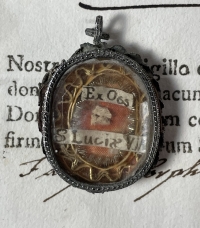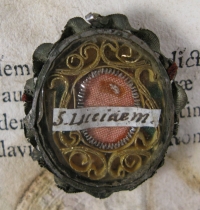St. Lucia of Syracuse, also known as Saint Lucy, is one of the most revered martyrs of early Christianity. Born in the late 3rd century in Syracuse, Sicily, Lucia is celebrated for her unwavering faith and her martyrdom during the persecution of Christians under the Roman Emperor Diocletian around the year 304 AD. Her name, derived from the Latin lux, meaning “light,” symbolizes her role as a beacon of spiritual clarity and courage.
According to tradition, Lucia consecrated her life and virginity to Christ and vowed to give her wealth to the poor. When her betrothed suitor learned of her vow and her refusal to marry him, he denounced her to the Roman authorities as a Christian. Despite brutal attempts to force her into renouncing her faith, including torture and threats of forced prostitution, Lucia remained steadfast. She was ultimately executed, and her legacy quickly spread throughout Christendom.
The veneration of St. Lucia began almost immediately after her death. By the 6th century, her name appeared in the Canon of the Mass, solidifying her importance in early Christian worship. Her feast day, celebrated on December 13th, is widely observed, particularly in Sicily and Scandinavian countries, where she is honored as the patron saint of light and sight.
The relics of St. Lucia have had a storied and often tumultuous history. Initially buried in Syracuse, her remains were later transferred to Constantinople in the 8th century to protect them from Arab invasions. During the Fourth Crusade in 1204, her relics were taken to Venice, where they now rest in the Church of San Geremia. Her head, however, is preserved in a separate reliquary in Syracuse, and smaller relics have been distributed to churches across Europe.
Devotees continue to venerate St. Lucia's relics, believing in their spiritual power and seeking her intercession, particularly for ailments of the eyes and sight. The veneration of her relics serves not only as a testament to her faith but also as a tangible link connecting generations of Christians to her enduring legacy. Through her relics and her story, St. Lucia remains a powerful symbol of faith, courage, and light in the face of darkness.










 Change language to English
Change language to English